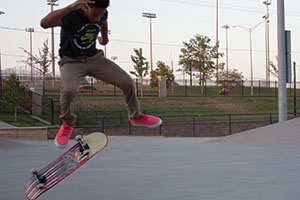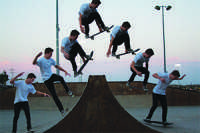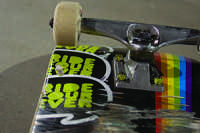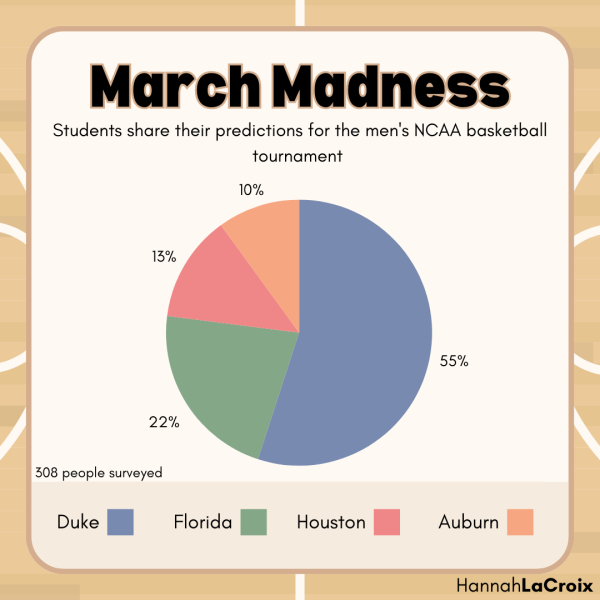Shredding the Streets

 Their afternoons consist of kickflips, boardslides, and ollies. The wheels of their skateboards grind the pavement as they prepare for the trick they’ve been perfecting for years. They jump, spin, and land like it’s easy. For them, it is. For sophomore Ian McRoberts and freshman Jackson Reeves, skateboarding is everything.
Their afternoons consist of kickflips, boardslides, and ollies. The wheels of their skateboards grind the pavement as they prepare for the trick they’ve been perfecting for years. They jump, spin, and land like it’s easy. For them, it is. For sophomore Ian McRoberts and freshman Jackson Reeves, skateboarding is everything.
“When I was younger, I used to watch my cousins skateboard,” McRoberts said. “It interested me because of how hard it looked, and how you could jump up into the air and land on something, and the board was still with you. That’s really what influenced me to start, and I’ve been skating ever since.”
They’ve dedicated their lives to skating ever since they first dropped a board down in front of them, similar to a few professionals whom they look up to. Their inspirations are the guys who share the exact same passion as them.
“My inspirations are Sean Malto and Ryan Sheckler,” McRoberts said.
“My inspiration is my cousin,” Reeves said. “He used to skate and he is in the Marines now.”
Then, laughing, Reeves changed his answer.
“My inspiration is actually the Skate God himself, Ian ‘Steezman’ McRoberts,” Reeves said.
Ryan Sheckler. Sean Malto. Tony Hawk. These are just a few of the professionals that some look up to as skating inspirations. But the chance of this becoming a career is just a mere dream for most.
“If I could make this a career I would,” McRoberts said. “But it’s not likely. I don’t play any other sports because I dedicate so much of my time to skateboarding. It isn’t something I’ll give up.”
Unlike organized team sports, skateboarding doesn’t have a coach. It’s just the skater and his board.
“The best part about skating is that it’s your fault if you mess up,” McRoberts said. “You don’t get yelled at by a coach, and you don’t let down your teammates. It’s just you, and you only have yourself to get mad at you.”
No matter how much a skater practices, they’ll never run out of tricks to perfect or even new ones to learn. They go out every day just because they love the activity. They aren’t trying to prove anything, it’s just an undying passion.
“It’s never really over,” McRoberts said. “You can always learn new tricks and get better. Also, it’s hard. It’s a challenge that you constantly work at. I’ve been skating for five years, and I still go out and skate every day. I just want to keep getting better.”
 Skateboarding can have a bad side though, too. According to an article written in 2008 on www.silverfishlongboarding.com, skateboarding has the fourth highest amount of emergency room visits out of any sport or activity that teens participate in, behind biking, football and baseball. Most of those are head injuries.
Skateboarding can have a bad side though, too. According to an article written in 2008 on www.silverfishlongboarding.com, skateboarding has the fourth highest amount of emergency room visits out of any sport or activity that teens participate in, behind biking, football and baseball. Most of those are head injuries.
When Reeves was fourteen years old, he was skating on a board that wasn’t his. The trucks were looser than he had gotten used to on his own board, which he was unaware of. He stood on the table of the halfpipe, preparing to drop in so he could speed down the slope into a trick he could execute perfectly on any given day. The moment he started toward the flat, he fell because of the unexpected loose trucks. The next day, he couldn’t remember anything, which made him and his mom worried. He went in to get tested, and the results came back that he had a concussion. Reeves was out of skating for a couple weeks until he recovered.
According to www.familyhealthmethod.com, people who are passionate about something try to do the most that they can without doing too much to the point of getting injured. Too often, they cross the line between doing enough and doing too much.
“If you want to get really really good, you’ll constantly walk on the edge of your capabilities,” www.familyhealthmethod.com said. “And sometimes you’ll fall over that edge, leading to injuries.”
Typically, students have a certain image in mind when they think of a skater.
“I see a lot of skateboarders wearing Vans and skinny jeans,” junior Ashley McKenny said. “They all seem to look and dress the same.”
Sophomore Ellie Augustine has a similar opinion as McKenny.
“All skaters have wispy hair and ear piercings,” Augustine said. “And they wear Vans and skinny jeans every day. They look punk rock.”
Contrary to popular belief, not all skaters are the same. They aren’t all the stereotypical punk rockers sporting the skinny jeans and rocking the hair flip.
“A lot of so-called ‘skaters’ wear skinny jeans and try to look punk rock,” McRoberts said. “Which is terrible because real skaters have style.”
In sports, uniforms are a given. Looking more like a professional team is something that is desired for coaches and players alike. The same goes for skaters.
“Baseball players wear baseball uniforms,” Reeves said. “Skaters wear what skaters wear. It just happens.”
Beyond the clothing stereotype, people can also generalize what a skater’s personality is like.
“Skaters have a weird vibe,” sophomore Seth Wingerter said. “They hide their emotions and act like they don’t care.”
However, there is more to skaters than people expect. They aren’t the ‘emotion hiding, skinny jean wearing, bad kids’ that you often hear people talking about in the halls. Despite what people say about skateboarders, not all fall under the stereotype.
“It’s common for people to think that skaters are bad kids,” Reeves said. “But we aren’t as bad as people think we are, we’re just like everyone else.”






